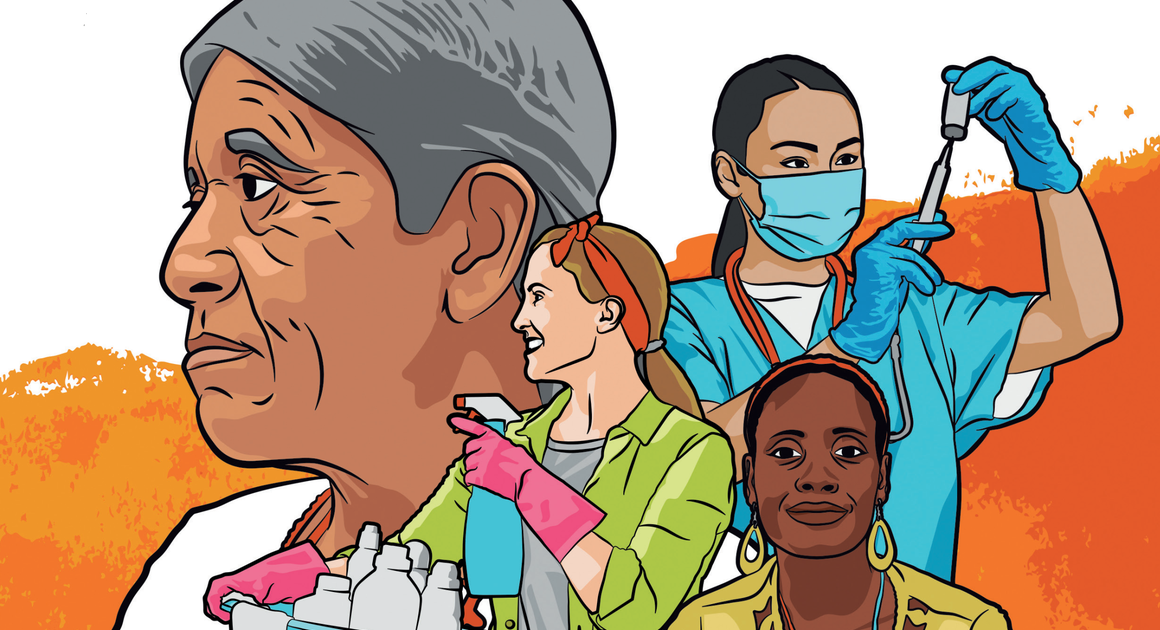29 October - #CareDay21 Unions stand up for Decent Work for Care Workers and Investment in Care

Trade unions across the world stand united today to commemorate the 2021 Global Day of Action on Care. We demand investment in care and decent work for care workers, with one voice. This will be the third time that the Global Day of Action on Care will be marked by the International Trade Union Confederation (ITUC), PSI and other global union federations (GUFs) which have affiliates organizing in the care sector.
- Read this in:
- en

Baba Aye
The #CareDay idea was born at a meeting of these GUFs which took place in September 2018, at Nyon, Switzerland. While it was resolved that the day would be 29 October every year, starting from 2019, the activity could not take place as envisaged that year. Instead, the 2019 World Day of Decent Work (WDDW) was marked under the banner of demands for the care worker. With the pandemic sweeping across the world in 2020, taking the earlier plans forward became even more urgent.
Health and Care workers have been on the frontlines of the COVID-19 response. Working under the stress and strains of the global health emergency, they have provided and continue to provide preventive and clinical services, long-term care, aged care, childcare, ambulatory care and disability care in our hospitals, homes, and communities.
Governments have applauded them. But applause is not enough. As they battle the SARS-CoV-2 virus and save lives, they have equally had to fight for appropriate personal protective equipment and other workplace safety measures, improved staffing levels and remuneration, and in many cases, even the right to organize and collective bargaining.
Video
"Reward" - Fixing the Care Crisis
Across the world, affiliates of Public Services International, have led the struggles of their members, as unions with unflinching commitment to defending care workers in these times and always. We thus flagged off the week leading to #CareDay21 with a PSI webinar on Monday 25 October. The webinar’s theme was Unions Defending Care Workers in COVID-19 Times.
Frontline care workers and unionists from all regions of the world told their stories. They spoke of the challenges they have faced and continue to face, the battles for decent work for care workers that they are waging, and the victories they have won.
We also paid specific attention to the state of care and conditions of care workers in regions that have been particularly ravaged by the COVID-19 pandemic. On Tuesday 26 October the European Federation of Public Services Union (EPSU) presented a research study on the impact of the pandemic on the state of care in Europe. EPSU/PSI affiliates in Europe have also organized a series of activities including deputations to their governments and the European parliament.
Latin America was the focus on Wednesday 27 October. A webinar was organized where The Current State of Care in Latin America report was presented. The report brings together case studies of national and local governments that have implemented gender-oriented public policies for care work. These case studies are on: Mexico, Costa Rica, Bogota City, Ecuador, Chile, Uruguay, and Argentina.
Podcast
RadioLabour interviews PSI General Secretary Rosa Pavanelli on the 5Rs of the Care Manifesto: Rebuilding the social organisation of care

And on Thursday 28 October, a PSI commissioned study on the global state of the social organization of care was launched. This was at a webinar organized by PSI in conjunction with our allies in the feminist movement and development sector.
The Social Organization: A Global Snapshot report is meant to set an agenda to rebuild the social organization of care, based on the principles of social co-responsibility, equality, and decent work which were earlier set out in the Manifesto for Rebuilding the Social Organization of Care, that PSI co-authored, at the beginning of the year.
The Social Organisation of Care: A Global Snapshot
Today, PSI affiliates across the world present letters to governments of their countries with demands for
Adequate funding of universal, quality public health and care – including mental health, childcare, early childhood education, elderly care, and other social care services - to ensure the creation of millions of jobs with decent work which includes fair wages, and humane working conditions; and to close gender gaps in labour force participation
Decent work for care workers, which includes adequate wages, equal pay for work of equal value, training opportunities, and occupational health and safety for workers in health, care and education, including home care workers
Equity and non-discrimination in recruitment, retention, access to training and promotion opportunities for workers across the health and care sectors
The rights to freedom of association and to collective bargaining to be fully respected for all workers in the health and care sectors, whether in the formal or informal economy, as well as their representation in the sectoral and social decision-making processes.
Public funding of universal, gender-responsive social protection accessible by all workers regardless of employment status or migrant status, racial or ethnic background, disability, gender, identity expression or sexual orientation, and inclusive of workers in the informal economy
Accessibility for all to quality public health and care services, including refugees and migrants, regardless of status.
And we wrap up the week with two webinars with the theme #InvestInCare, jointly organized with ITUC, Education International (EI), UNI Global Union, International Domestic Workers Federation (IDWF), Women in the Informal Employment: Globalizing Organizing (WIEGO) to mark #CareDay21 together.
- Tags (4)

